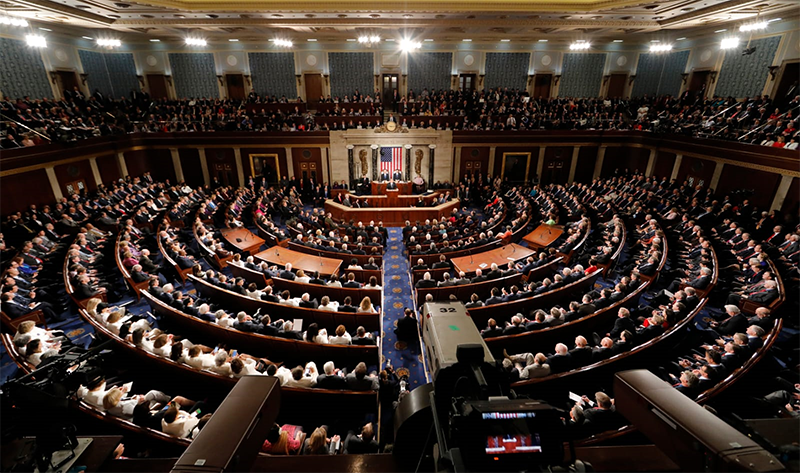The “Al-Aqsa Flood” operation, conducted by the Hamas movement on October 7, against Israeli settlements around the Gaza Strip, resulted in a notable shift in the stance of the administration of President Biden towards the Israeli government led by Benjamin Netanyahu. This shift was driven by the recognition that several policies pursued by the Israeli government were against longstanding foundations of US-Israeli relations and conflicted with the interests and objectives of the United States in the Middle East.
Subsequently, numerous legislators and Republican candidates running for the upcoming presidential elections capitalized on this development to criticize the regional policies pursued by the Biden administration, a matter that has raised concern among many Democrats. This situation has brought to light the consequences of partisan divisions on the US’s ability to pursue its interests and objectives on the international stage.
Key issues
The “Al-Aqsa Flood” operation and subsequent Israeli escalation in the Gaza Strip have sparked various concerns within the US. This comes at a time when the US administration is grappling with several internal issues, presenting both a challenge and an opportunity. The following issues have emerged as particularly significant:
1. Connecting aid to Israel with aid to Ukraine: While many Republican lawmakers in the House of Representatives oppose the continuation of American aid to Ukraine, the US President and Democrats who advocate for its continuation are seeking to leverage Israel’s reliance on American assistance. This approach aims to establish a connection between aid to Israel and aid to Ukraine, and potentially extend it to Taiwan, which is currently facing mounting pressure from China. The objective is to enhance the prospects of Republicans approving the US administration’s request for aid to Ukraine.
However, several Republicans have expressed their opposition to an Israeli aid package that includes assistance to Ukraine. Republican Representative Marjorie Taylor Greene, who opposes aid to Ukraine, argues that US funding for Ukraine indirectly fuels the ongoing conflict with Russia. In contrast, she emphasizes that Israel has its government and is capable of defending itself, asserting that these two issues should not be intertwined. Similarly, Representative Don Bacon asserts that linking American funding to Israel with funding to Ukraine amounts to holding one hostage to the other, which he vehemently opposes. Republican Brian Mast outright rejects the notion of combining the two funds, affirming his support for aid to Israel while expressing reservations about assisting Ukraine due to the absence of a clear plan. He further emphasizes that aid to Israel is contingent upon specific objectives.
While there is opposition among Republicans regarding the connection between aid to Israel and aid to Ukraine, a faction of Republicans, including Republican Representative Mike McCaul, Chairman of the House Foreign Affairs Committee, have expressed their willingness to support the combination of aid to Ukraine and Israel as part of a comprehensive package encompassing diverse foreign policy objectives. The absence of a newly elected Speaker of the House of Representatives following the removal of former Speaker Kevin McCarthy poses a significant challenge to the enactment of draft legislation about US aid for either Israel or Ukraine.
2- Strong pressure exerted by progressive Democrats: Despite the Democrats’ unwavering support for providing additional aid to Israel and their unconditional solidarity with the nation, a faction of progressive Democrats is advocating for a more comprehensive approach that combines aid with initiatives aimed at fostering peace and stability. Thirteen Democrats, including prominent progressive figures like Rashida Tlaib, Alexandria Ocasio-Cortez, and Cori Bush, have urged the Biden administration to actively facilitate de-escalation, dispatch humanitarian assistance to Gaza, and secure a ceasefire. This group of progressive Democrats vehemently opposes the Israeli military operation in the Gaza Strip, with Representative Rashida Tlaib, the sole Palestinian-American member of the House of Representatives, denouncing it as a war crime that inflicts collective punishment upon millions of Palestinians.
Fifty-five Democratic members of the House of Representatives, some of whom have previously voiced reservations about Israeli policy, have collectively addressed a letter to President Biden. The purpose of the letter is to implore the administration to communicate to Israel the upholding of international law in its response to the attack and to undertake all necessary measures to mitigate the impact on innocent civilians. Furthermore, the signatories advocate for the establishment of a humanitarian corridor and emphasize the inclusion of humanitarian aid for both Gaza and Israel in funding requests submitted to Congress. The letter expresses deep concern regarding the directive to evacuate over a million civilians from northern Gaza within a 24-hour timeframe, as well as recent statements made by Israeli military commanders advocating for a complete blockade of the Gaza Strip.
3- Preventing Iran from acquiring $6 billion: Several Republican legislators expressed opposition to the prisoner exchange agreement between Iran and the United States. This agreement entailed the release of five American prisoners in exchange for the release of five Iranian prisoners and the unfreezing of $6 billion in Iranian oil revenues held in South Korea. These lawmakers capitalized on Operation “Al-Aqsa Flood” to advocate for the cessation of funds to Iran, out of fear that these funds might be utilized to bolster Hamas. Critics of the agreement see that these funds could potentially be channeled towards military expenditures and support for Hamas, utilizing taxpayers’ money from the US.
Former President, Donald Trump, the leading contender for the Republican Party nomination in the forthcoming presidential elections, along with other Republican candidates, attributed responsibility to the Biden administration for the “Al-Aqsa Flood” operation. Governor Ron DeSantis of Florida, for instance, asserted that the policies implemented by President Biden have facilitated Iran’s financial gains, consequently resulting in Israel bearing the consequences of these policies.
On the other hand, officials from the administration assert that the allocated funds have not been utilized thus far and do not originate from US taxpayers. Instead, they represent payments made by South Korea to Iran in exchange for oil in recent years. These funds became immobilized in South Korea as a result of US sanctions imposed on Tehran. Presently, the funds are securely held within a limited account in Doha and are intended solely for humanitarian objectives, such as the procurement of essential provisions like food and medicine for the Iranian population.
4- The pace of ratifying the US ambassador to Israel has been a matter of urgency. The US has been without an ambassador to Israel since July of last year. The recent events surrounding the “Al-Aqsa Flood” operation and subsequent Israeli military actions have compelled the White House to expedite the appointment of Jack Lew, the former Secretary of the Treasury in the administration of former President Barack Obama, as the new US ambassador to Israel, replacing Thomas Nides.
The Democrats, who hold the majority in the Senate, have taken proactive steps to accelerate the confirmation process for Lew. However, numerous Republican lawmakers opposed his appointment due to his previous endorsement of policies supporting the nuclear agreement between the Obama administration and Iran in July 2015. Democratic Senator Ben Cardin, who chairs the Senate Foreign Relations Committee, announced that the committee will hold a session on October 18 to ratify his nomination, because the United States is currently in dire need of having an ambassador in Tel Aviv.
Constant criticism
President Biden’s inauguration marked a significant shift in US policy towards the Palestinian-Israeli conflict. He pledged to return to the two-state solution and to oppose the expansion of settlements, distancing himself from the policies of the previous US administration and the Israeli government. However, in practice, these commitments have not been fully realized. The Trump administration’s policy shifts did not adequately address the conflict or fulfill the promised commitments to the Palestinians. Consequently, there has been a growing wave of criticism towards the administration’s approach, particularly in the year leading up to the American presidential elections, as President Biden seeks re-election.


